Integrated Group Efforts to Reduce Environmental Footprint
MARUI GROUP views all of its business assets as being borrowed from society. Based on this belief, all Group employees practice autonomy in expanding the scope of our socially beneficial activities and proposing fulfilling lifestyles steeped in the unique characteristics of MARUI GROUP. This objective is to be accomplished while advancing eco-friendly business activities.
- MARUI GROUP Environmental Policy
- Initiatives for Combating Climate Change Together with Business Partners and Customers
- Decarbonization and Resource Conservation Initiatives
- Carbon Footprints
- Carbon Offset
- Incorporating Reduction into Business Activities
- Reuse Promoted through Clothing and Shoe Trade-in Programs
- Waste Reduction from Preventing the Creation of Products that Go Unused
- Ecological Network of Biodiversity
MARUI GROUP Environmental Policy
Basic Policy
MARUI GROUP CO., LTD., is promoting green businesses, which provide options for coexistence with the global environment, as described in MARUI GROUP's 2050 Vision, its long-term vision. This undertaking is prefaced on our belief that helping build a sustainable society and global environment through our business is part of our ethical responsibility toward future generations.
We recognize the importance of implementing PDCA (plan-do-check-act) cycles to manage our efforts to reduce environmental impacts while generating profits. Based on this recognition, MARUI GROUP has laid out a clear basic policy and defined priority issues and action policies.
-
1. Environmental Management
At MARUI GROUP, deliberation and decisions regarding initiatives for addressing environmental issues as well as the execution of these initiatives are carried out by the Sustainability Committee, an advisory body to the Board of Directors, and the ESG Committee, an organization positioned under the Compliance Promotion Board. Ongoing management of these initiatives is practiced through the implementation of PDCA cycles. In addition, coordination is pursued with divisions related to energy, resources, products, tenant development and management, and sustainability in advancing initiatives for addressing environmental issues. Furthermore, steps are taken to strengthen governance pertaining to environmental management through reports and proposals to the Board of Directors and the MARUI GROUP Environmental Policy is reviewed on an annual basis.
-
2. Legal Compliance
MARUI GROUP complies with environmental legislation, regional ordinances and agreements, the laws of relevant countries, and international environmental standards. Emphasis is also placed on abiding with international agreements, such as the United Nations Sustainable Development Goals.
-
3. Environmental Due Diligence
The priority issues that MARUI GROUP will need to tackle going forward cannot be surmounted by the Group alone. Rather, overcoming these challenges will require co-creation with all of MARUI GROUP's stakeholders and across its value chain. Recognizing this fact, MARUI GROUP practices environmental due diligence through a process of accurately identifying material environmental risks, issuing reports, pursuing improvements, and monitoring progress. Input from various stakeholders is utilized throughout this process.
-
4. Stakeholder Engagement
MARUI GROUP has defined its mission as promoting harmony and the expansion of the intersection between the interests (happiness) of six groups of stakeholders—customers, investors, business partners, communities and society, employees, and future generations. Accordingly, MARUI GROUP is incorporating feedback from and stepping up engagement with various stakeholders in its quest to address environmental issues through co-creation.
-
5. Environmental Awareness Improvement
MARUI GROUP aspires to improve environmental awareness through joint efforts with various stakeholders. Specific examples of such efforts include training for Group officers and employees aimed at facilitating the understanding and dissemination of environmental issues and the MARUI GROUP Environmental Policy and promoting related actions as well as communication activities aimed at customers and business partners.
-
6. Transparent Environmental Information Disclosure
MARUI GROUP conducts environmental information disclosure based on the recommendations of the Task Force on Climate-related Financial Disclosures and other international information disclosure standards. Periodic disclosure regarding environmental activities, their results, and the impacts on the Company's finances is conducted, third-party verification is received, and transparency is ensured.
Priority Issues and Action Policies
-
1. Climate Change
Climate change is an issue that threatens the very survival of the human race. In fact, this phenomenon has come to be referred to as a climate crisis. To address and help mitigate climate change based on the consensus laid out in the Paris Agreement, MARUI GROUP is implementing new measures, participating in international initiatives, promoting action across the supply chain, and taking other steps to realize a carbon-negative status.
- Reduction of Greenhouse Gas EmissionsMARUI GROUP is engaged in energy conservation and renewable energy initiatives as part of its efforts to reduce greenhouse gas emissions. We consistently calculate the volume of emissions from MARUI GROUP and from across its value chain while pursuing emissions reduction goals that have been certified by the international initiative Science Based Targets to help keep the average global temperature below 1.5°C above pre-industrial levels.
- Energy ConservationMARUI GROUP is working to conserve energy through co-creation with stakeholders. For example, it is installing energy-efficient equipment in stores and offices, implementing other electricity-saving initiatives, cutting overtime hours through work style reforms, promoting green buildings, recruiting tenants dedicated to reducing environmental impacts, and encouraging business partners to conserve energy.
- Renewable Energy UtilizationAs a member of the RE100 initiative, MARUI GROUP aims to source 100% of its electricity from renewable energy. To this end, we are introducing renewable energy at Group stores and offices to move toward the accomplishment of our medium-to-long-term targets. In addition, we encourage customers to switch to electricity generated from renewable sources in order to propose fulfilling yet ecologically sound lifestyles.
-
2. Resource Recycling
MARUI GROUP is promoting resource recycling across its value chain, at steps including production, distribution, and product use, to preserve the planet's finite resources. Through co-creation with customers, business partners, and other stakeholders, we are promoting effective resource use, reducing waste, and combating pollution through proper chemical management with the goal of contributing to the realization of a sustainable, recycling-oriented society.
- Waste ReductionMARUI GROUP recognizes that it has a responsibility to reduce waste from its own activities as well as throughout its value chain spanning from material procurement to manufacturing, product sales, and product disposal. Accordingly, we are promoting the 3Rs (reduce, reuse, and recycle) and urging business partners to refrain from engaging in excessive production and cut back on their use of disposable items.
- Sustainable Product DevelopmentMARUI GROUP is developing recyclable products while utilizing biodegradable plastic and biological and renewable materials. In addition, we take part in co-creation with business partners in a supply chain-wide drive to deliver sustainable products and services through the reduction of environmental impacts, proper management of chemical substances, and other means.
- Proper Waste DisposalMARUI GROUP furnishes systems for disposing of food, industrial, and other waste, and we are promoting proper waste disposal for purposes such as preventing pollution. We also ask tenants and others at our business sites to properly sort waste in an effort to improve recycling rates.
- Reduction of Container- and Packaging-Related Environmental ImpactsMARUI GROUP is transitioning to more eco-friendly materials for the shopping bags, gift wrapping, and other containers and packaging used in its stores and e-commerce operations with the goal of reducing the amount of plastic waste produced throughout society. We are also acquiring environmental certifications in this regard. At the same time, we encourage tenants to reexamine the materials used for their shopping bags and product packages.
- Reduction of Food Loss and WasteTogether with its customers and business partners, MARUI GROUP endeavors to reduce food waste by promoting smaller portions and pre-ordering for food items. Moreover, food waste is rigorously sorted at business sites to improve recycling rates.
- Water Resource ManagementMARUI GROUP manages water resources with the goal of minimizing water pollution and emissions of hazardous chemicals and reducing its water consumption. We also encourage business partners and other associates across the supply chain to act in accordance with our CSR procurement policies in order to prevent water pollution along with the use of hazardous chemicals in product manufacturing activities.
-
3. Preservation of Sustainable Ecosystems
Our lives and economic activities are built on the natural blessings bestowed upon us by sustainable ecosystems. MARUI GROUP seeks to help preserve sustainable ecosystems through co-creation with its stakeholders. We are thus exercising consideration for biodiversity and engaging in CSR procurement with responsible suppliers.
- Sustainable ProcurementMARUI GROUP approaches business partners to promote responsible and sustainable procurement across the supply chain and thereby ensure that it is able to supply customers with safe and secure products. We are committed to the appropriate procurement and use of materials and foods, goals we are pursuing by selecting organic materials subject to management of chemical substances and by taking precautions regarding animal welfare and the sustainability of production regions. In addition, MARUI GROUP aims to improve the reliability of its traceability measures.
- Harmony with NatureMARUI GROUP engages in co-creation with local communities for the purpose of preserving healthy ecosystems. This co-creation takes forms such as store and greenery development measures that are considerate of biodiversity and initiatives for combating the urban heat island phenomenon. Meanwhile, co-creation is pursued with customers to promote harmony with nature through means such as providing customers with opportunities and venues for engaging with nature.
-
Segment Initiatives
MARUI GROUP is advancing the following segment initiatives based on the aforementioned priority issues and action policies.
1. Retailing Segment
- Store Initiatives
- – Promote energy conservation and renewable energy use
- – Coordinate with tenants in waste reduction, water conservation, recycling, and other initiatives
- – Transition to new packaging and container materials, utilize electronic receipts, and advance other resource conservation initiatives
- – Reduce food waste through smaller portions and pre-orders for food products
- – Utilize sustainable materials for facility interiors and exteriors
- – Recruit experience-providing, direct-to-consumer, and other tenants
- Omni-Channel Retailing Initiatives
- – Expand order pickup sites to limit need for re-delivery
- – Practice cyclical distribution between bases and other eco-friendly distribution activities
- – Reduce environmental impacts by reviewing packaging and container materials
- Product and Service Development
- – Develop eco-friendly products and services through co-creation with customers
- – Reduce waste by providing products matched to customer needs
- – Create business models compatible with circular economies
2. FinTech Segment
- Credit Card Initiatives
- – Develop credit card surfaces using low-environmental impact materials
- – Conserve resources through electronic billing statements, etc.
- Environmental Awareness Initiatives Targeting Cardholders
- – Propose switch to electricity from renewable sources
- – Provide options to use points for donations to environmental NPOs, etc.
3. New Businesses
- Eco-Friendly Product and Service Development
- – Develop new products using renewable materials
- – Practice sustainable procurement through traceability of materials and food products, etc.
- – Utilize materials with environmental certifications
- Proposal of Ecologically Sound Lifestyles
- – Create businesses attuned to new values
- – Propose new, eco-friendly food options
- – Offer eco-friendly living proposals
Established in 2008
Revised in November 2016
Revised in April 2020
Revised in March 2022
Sustainability Management System
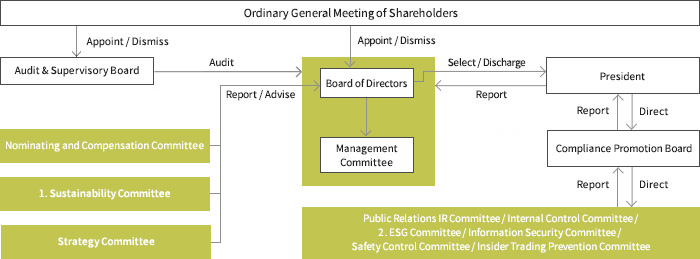
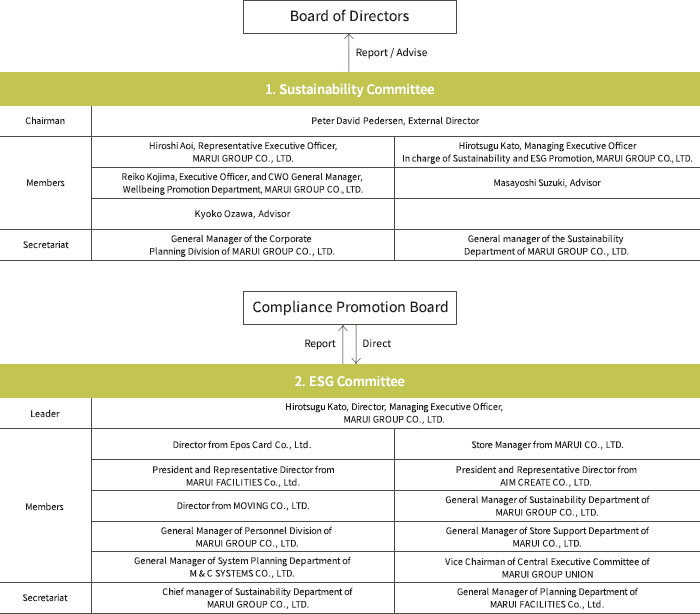
Targets Leading up to 2050
In the fiscal year ending March 31, 2018, MARUI GROUP set medium-to-long-term greenhouse gas reduction targets leading up to 2050 based on the projected changes to its business activities and its future impacts on natural capital. These targets have been approved by the Science Based Targets initiative.
MARUI GROUP's new greenhouse gas emissions reduction target was certified by the Science Based Targets initiative as a target for keeping average temperatures below 1.5℃ above pre-industrial levels on September 30, 2019.
Medium-to-Long-Term Greenhouse Gas Reduction Targets
| Medium-Term Targets (~2030) | A 80% reduction in Groupwide total greenhouse gas emissions attributable to Scope 1 and Scope 2 and a 35% reduction in emissions attributable to Scope 3 from the level in the fiscal year ended March 31, 2017 |
| Long-Term Target(~2050) | A 90% reduction in Groupwide total greenhouse gas emissions attributable to Scope 1 and Scope 2 from the level in the fiscal year ended March 31, 2017 |
Going forward, MARUI GROUP will continue working to reduce its environmental footprint through a concerted Group effort.
Initiatives for Combating Climate Change Together with Business Partners and Customers
MARUI GROUP views all of its business assets as being borrowed from society, and is therefore promoting eco-friendly business activities through means such as combating climate change and preventing pollution in a concerted Groupwide effort. In addition, we recognize our responsibility as a producer to track our environmental footprint across the entire value chain, from the procurement of raw materials and product creation to the sale and disposal of products.

(Fiscal year ended March 31, 2022)
Eight Consecutive Years of Reductions in CO2 Emissions
The Company has traditionally calculated emissions of CO2 and other greenhouse gases based on Scope 1 and Scope 2 of the Greenhouse Gas Protocol, and it began calculating emissions under Scope 3 during the fiscal year ended March 31, 2014. We are thereby able to track environmental impacts across the entire value chain, including direct and indirect emissions from MARUI GROUP (Scope 1 and Scope 2) as well as emissions from raw material procurement, transportation, and products purchased by customers. Through this type of traceability that exceeds the boundaries of the Group, we are advancing initiatives for reducing environmental impacts together with customers, business partners, communities, and society as a whole. These initiatives have helped us achieve four consecutive years of reductions in CO2 and other greenhouse gas emissions.
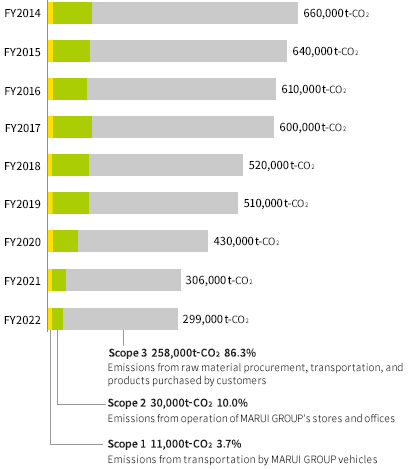
Third-Party Verification for CO2 and Other Greenhouse Gas Emissions
In order to improve the reliability of the environmental information it discloses, MARUI GROUP began receiving third-party verification for its CO2 and other greenhouse gas emissions from the Japan Quality Assurance Organization in the fiscal year ended March 31, 2017. This verification is received for all 15 categories of emissions applicable under Scope 1, Scope 2, and Scope 3.
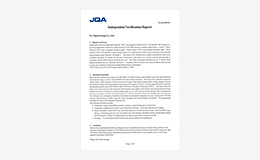
-
Independent Verification Report (FY2021)

Third-Party Verification Institution
Japan Quality Assurance Organization (JQA)
Scope 3 Emissions Data
| Category | CO2 emissions t-CO2 | |||||
|---|---|---|---|---|---|---|
| FY2018 | FY2019 | FY2020 | FY2021 | FY2022 | ||
| 1 | Purchased goods and services | 239,000 | 211,000 | 122,000 | 98,000 | 96,000 |
| 2 | Capital goods | 10,000 | 31,000 | 35,000 | 36,000 | 29,000 |
| 3 | Fuel and energy related activities not included in Scope 1 or 2 |
10,000 | 10,000 | 15,000 | 10,000 | 9,000 |
| 4 | Transportation and delivery (upstream) | 8,000 | 9,000 | 8,000 | 7,000 | 6,000 |
| 5 | Waste generated in operations | 900 | 600 | 500 | 1,000 | 1,000 |
| 6 | Business travel | 2,000 | 1,000 | 2,000 | 900 | 1,000 |
| 7 | Employee commuting | 2,000 | 2,000 | 2,000 | 2,000 | 2,000 |
| 8 | Leased assets (upstream) | 6,000 | 7,000 | 5,000 | 5,000 | 4,000 |
| 9 | Transportation and delivery (downstream) | 112,000 | 109,000 | 143,000 | 80,000 | 94,000 |
| 10 | Processing of sold products | N/A | N/A | N/A | N/A | N/A |
| 11 | Use of sold products | 11,000 | 12,000 | 9,000 | 8,000 | 7,000 |
| 12 | End-of-life treatment of sold products | 5,000 | 5,000 | 6,000 | 6,000 | 3,000 |
| 13 | Leased assets (downstream) | 5,000 | 5,000 | 6,000 | 6,000 | 6,000 |
| 14 | Franchises | N/A | N/A | N/A | N/A | N/A |
| 15 | Investments | 50 | 50 | 50 | 40 | 40 |
| Reference | ||||||
| Scope 1 greenhouse gas emissions | 14,000 | 15,000 | 14,000 | 11,000 | 11,000 | |
| Scope 2 greenhouse gas emissions | 99,000 | 96,000 | 68,000 | 38,000 | 30,000 | |
| Scope 3 greenhouse gas emissions | 412,000 | 400,000 | 352,000 | 257,000 | 258,000 | |
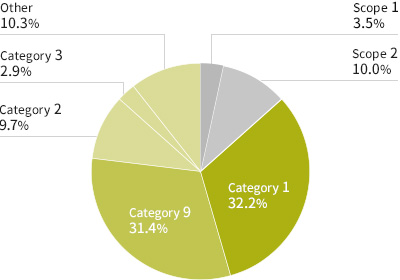
Scope of data collection: All Group business activities
Scope of category application: 13 applicable categories of a total of 15 categories
Overview of calculation methodology: Data collected through internal system database
- – Category 1: Emissions from procurement activities related to private-brand products and business activities
- – Category 9: Calculated based on surveys on the methods of transportation customers use to visit Marui stores
- – Category 11: Calculated based on surveys on customer preference toward washing apparel items or having them cleaned and the total number of times items are washed each year (original usage scenarios developed by MARUI GROUP)
Calculation method: The Company calculates emissions volumes based on the Basic Guidelines on Accounting for Greenhouse Gas Emissions Throughout the Supply Chain, released by the Ministry of the Environment and the Ministry of Economy, Trade and Industry. The results of these calculations have been confirmed by Mizuho Information & Research Institute, Inc.
Important Points
MARUI GROUP calculates emissions applicable under category 9 and category 11 of Scope 3 based on a customer survey conducted in 2016.
Emissions attributable to category 9 (downstream area transportation and delivery) were calculated based on the methods of transportation customers use to visit Marui stores. For the roughly 30% (average for all stores) of customers that walked to stores, CO2 emissions were logged as zero. Looking ahead, MARUI GROUP will continue to examine possible CO2 emissions reduction activities that can be advanced through co-creation with customers.
Emissions attributable to category 11 (use of sold products) were calculated based on trends in washing apparel items arrived at through original usage scenarios developed by MARUI GROUP. By encouraging customers to buy eco-friendly products, we are proposing ecological lifestyles to customers seeking to contribute to the resolution of environmental issues.
The calculation methods of Scope 3 emissions and the calculated results will be incorporated into co-creation activities with customers and other stakeholders to pursue further reductions in environmental footprints.
This sustainability website is designed to accommodate people with color blindness.









